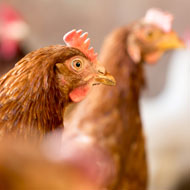Charity forced to let 12,000 hens go to slaughter

“We are best known for saving the lives of thousands of hens intended for slaughter so this is a difficult time for us". (stock photo)
The British Hen Welfare Trust is currently on ‘lockdown’ and has been forced to let 12,000 hens go to slaughter amid concerns about avian influenza in the UK.
The hens were due to be collected by the charity for rehoming in December, January and February but UK restrictions to prevent the spread of avian influenza meant the birds had to go to slaughter.
A prevention zone in place until 28 February requires poultry and other captive birds to be housed indoors or otherwise separated from wild birds. Gatherings of birds are also temporarily prohibited. The measures were put in place following outbreaks of avian influenza H5N8 in Europe.
Outbreaks have also been confirmed on a Lincolnshire turkey farm in December and in backyard flocks in Wales and Yorkshire, as well as in wild birds in England, Scotland and Wales.
The British Hen Welfare Trust finds retirement homes for caged hens destined for slaughter. Its founder, Jane Howorth MBE, commented: “We are best known for saving the lives of thousands of hens intended for slaughter so this is a difficult time for us.
“However, we take pride in acting responsibly and agree that Defra’s decision to extend the prevention zone to help protect national backyard and commercial poultry was the right one.
“Everything we do as a charity revolves around hen welfare so we are greatly saddened that 12,000 hens didn’t get their chance to enjoy a free range retirement, but we are looking forward to March when we hope that thousands will be able to enjoy the spring sunshine for the first time.”
The charity is reminding hen keepers that the latest outbreak of avian flu was in a backyard flock, and that it is currently a legal requirement to house birds indoors.



 The veterinary mental health charity Vetlife is inviting the veterinary community to join it for a sponsored cold-water dip.
The veterinary mental health charity Vetlife is inviting the veterinary community to join it for a sponsored cold-water dip.